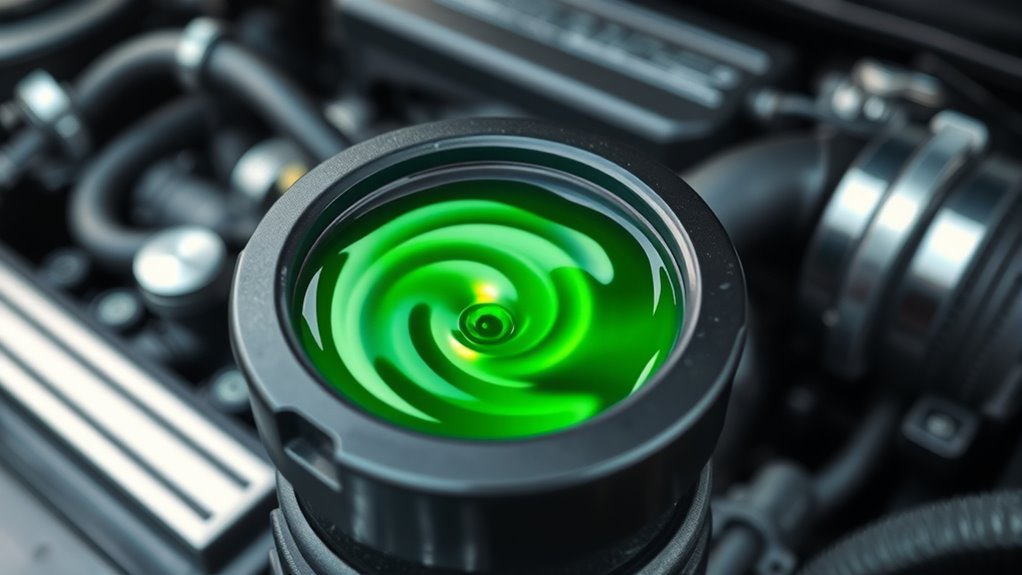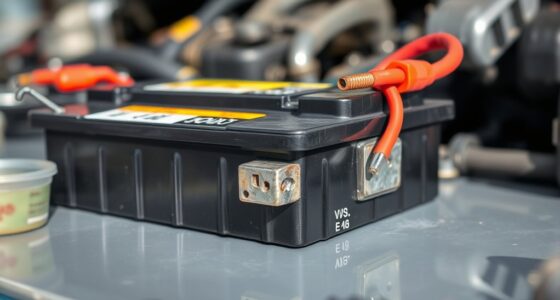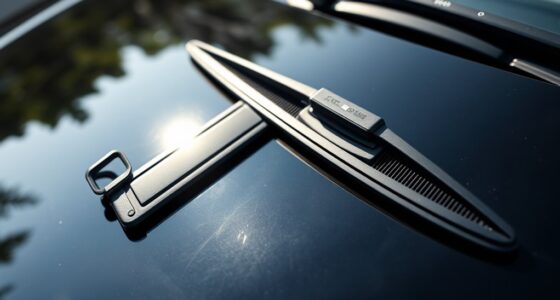Coolant and antifreeze protect your engine from extreme temperatures by circulating through the cooling system to prevent overheating or freezing. They’re typically a mix of water and glycol, with additives that prevent corrosion. There are different types, like inorganic and organic antifreeze, each with specific lifespans and compatibilities. Using the right type and maintaining your coolant guarantees your vehicle runs smoothly. Keep going to discover more about choosing and caring for your coolant system.
Key Takeaways
- Coolant and antifreeze regulate engine temperature, preventing overheating in summer and freezing in winter.
- They are typically a water and glycol mixture that transfers heat and prevents corrosion.
- There are inorganic (IAT), organic (OAT), and hybrid (HOAT) antifreezes, each with different longevity and protection features.
- Mixing incompatible coolants can cause damage; always use the manufacturer-recommended type.
- Regular maintenance and proper coolant levels ensure engine efficiency and prevent costly repairs.

Coolant and antifreeze are essential fluids that keep your vehicle’s engine running smoothly, no matter the weather. They circulate through your engine’s cooling system, helping to regulate temperature and prevent overheating or freezing. Understanding what these fluids are made of and the different antifreeze types can help you make informed decisions about maintenance and guarantee your vehicle stays reliable year-round.
Coolant and antifreeze keep engines running smoothly in all weather conditions.
When it comes to coolant composition, most coolants are a mix of water and glycol-based substances. The glycol, typically ethylene glycol or propylene glycol, acts as an antifreeze agent, lowering the freezing point and raising the boiling point of the mixture. This balance ensures your engine remains at an ideal temperature regardless of external conditions. Additionally, coolants contain corrosion inhibitors that protect engine parts from rust and scale buildup, prolonging the lifespan of your cooling system. The precise formulation varies by manufacturer, but the goal remains the same: to provide effective heat transfer while preventing damage caused by extreme temperatures. Coolant chemistry plays a critical role in overall engine health.
Antifreeze types primarily fall into two categories: inorganic and organic. Inorganic antifreeze, often called IAT (Inorganic Acid Technology), contains silicates and phosphates to provide quick corrosion protection. However, these formulas typically require more frequent replacements—usually every two years—since their protective properties diminish over time. On the other hand, organic antifreeze, known as OAT (Organic Acid Technology), relies on organic acids to offer longer-lasting corrosion resistance, sometimes up to five years. Hybrid formulas, or HOAT (Hybrid Organic Acid Technology), combine elements of both, providing extended protection with fewer maintenance requirements. Choosing the right antifreeze type depends on your vehicle’s specifications, climate, and manufacturer recommendations.
It’s also worth noting that not all antifreezes are compatible with each other. Mixing different types can cause chemical reactions that lead to gel formation or reduced effectiveness, which might compromise your engine’s protection. Always check your owner’s manual to see which antifreeze type is recommended and ensure you stick to that specification when topping off or replacing your coolant. Remember, using the wrong type of antifreeze can lead to costly engine damage or cooling system failures.
Frequently Asked Questions
Can I Use Water Instead of Coolant in My Vehicle?
You might wonder if water can replace coolant in your vehicle. While water alternatives like distilled water or coolant substitutes can temporarily cool your engine, they’re not ideal long-term. Water alone lacks the antifreeze properties and corrosion protection that coolant provides. Using just water can cause overheating, rust, and damage. It’s best to use the proper coolant mixture recommended by your vehicle’s manufacturer for safe, reliable engine cooling.
How Often Should I Change My Vehicle’S Coolant or Antifreeze?
Changing your coolant is like giving your engine a fresh breath. You should typically replace your antifreeze every 30,000 to 50,000 miles or every 2 to 5 years, depending on your vehicle and coolant type. Regular antifreeze maintenance guarantees maximum coolant lifespan, preventing corrosion and overheating. Check your owner’s manual for specific recommendations, and don’t ignore signs like leaks or overheating—timely changes keep your engine running smoothly.
What Are the Signs of Coolant or Antifreeze Leaks?
You should watch for warning signs of a coolant or antifreeze leak, like a sweet smell, puddles under your car, or overheating. Leak detection can be tricky, but if you notice your temperature gauge rising or steam from the engine, it’s a clear sign. Regularly inspect hoses and the radiator for cracks or corrosion, and don’t ignore any signs—you’ll prevent costly repairs and keep your engine running smoothly.
Are There Different Types of Coolants for Specific Vehicle Models?
You’ll find that there are different types of coolants tailored for specific vehicle models. Always check your owner’s manual for vehicle-specific formulations, as manufacturers recommend certain coolants to guarantee ideal performance. Using the right coolant prevents corrosion and overheating. Stick to manufacturer recommendations, and don’t mix different types of coolants, which can cause clumping. When in doubt, consult a mechanic to choose the best coolant for your vehicle.
Is Mixing Different Brands of Coolant Safe for My Vehicle?
Mixing different brands of coolant isn’t always safe because of potential chemical interactions that can reduce effectiveness or cause corrosion. You should prioritize brand compatibility and stick to the same type recommended for your vehicle. If you must mix, verify the coolants are compatible, like both being ethylene glycol-based. Otherwise, it’s best to drain and replace with the same brand or type to keep your cooling system working properly.
Conclusion
Now that you know the ins and outs of coolant and antifreeze, you’re better equipped to keep your engine running smoothly. Regular checks and proper maintenance can prevent your car from overheating or freezing—saving you from a catastrophe that’s almost as bad as a volcano erupting under your hood. Think of coolant as your engine’s lifeblood; treat it with respect, and your vehicle will thank you by delivering peak performance every time you turn the key.









